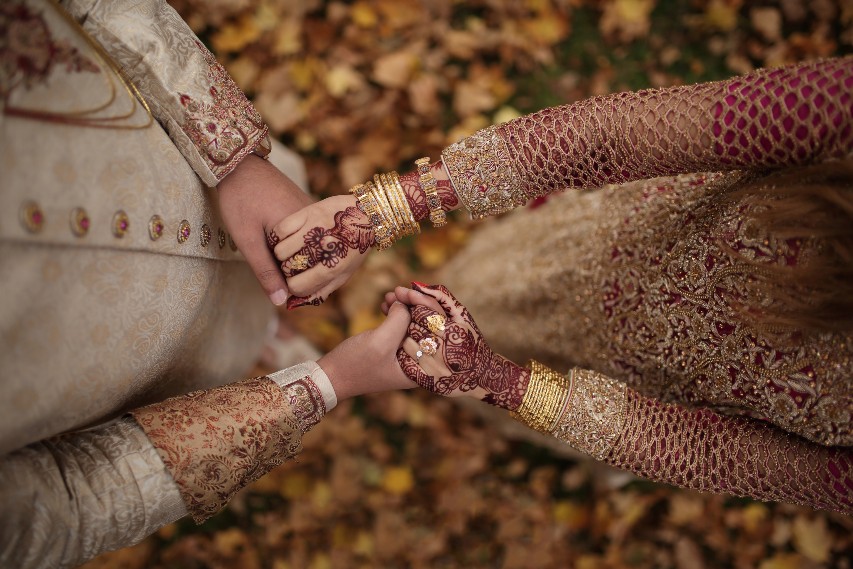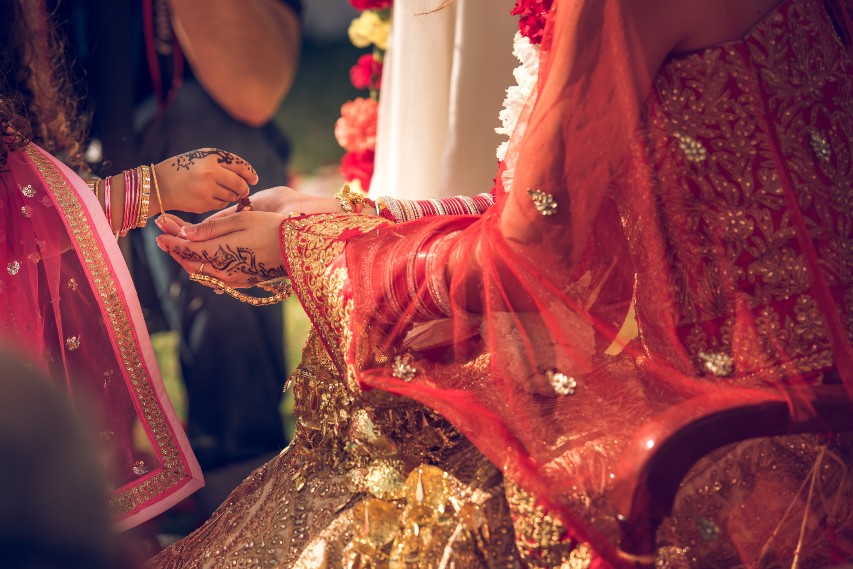
Indian Wedding Traditions
Indian traditions stretch back thousands of years and include many cultural variations. There is no single way to conduct an Indian wedding or have one proper Indian wedding venue and traditions. However, Indian wedding venues and traditions, particularly for Hindu weddings, have motifs and similarities reflecting Indian values and beliefs.
An Indian wedding represents a joyous occasion that allows the family and friends to celebrate with the Indian couple and enjoy Indian foods, music, clothing, and decoration.
The wedding lasts three days, with the ceremony on the last day. Some preparations happen a week or more before the ceremony, reflecting India’s rich culture and commitment to supporting new couples as they start married life.
Preparing for the Wedding
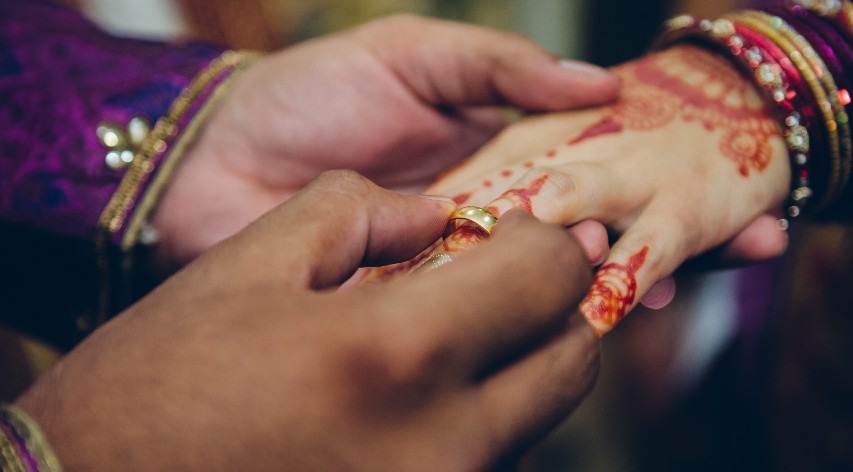
Choosing a Wedding Venue
Indian weddings typically involve a large number of guests to avoid offending anyone by leaving them out. Indians often book large banquet halls for the event to accommodate the crowd.
Luckily, Metropol Event Venue offers the choice of four glamorous and spacious ballrooms, seating up to 400 guests, and leaving no one behind. With a blank canvas ballroom and fully customizable amenities, our all-inclusive wedding venue is the ideal place for couples to start their newlywed life.
Wedding Guests
Wedding guests will typically wear traditional Indian clothing in bright colors to match the celebratory mood. In many East Asian and Indian cultures, red symbolizes good fortune. Many guests wear red to the wedding to get the new couple’s marriage off on the right foot.
Wedding Gifts
Money has become a traditional gift at Indian weddings. Guests should give a gift with a value ending in one, such as $101 or $201. The extra “1” symbolizes that the gift will grow and bring prosperity to the married couple. The money can offset the financial cost of the Indian wedding venue and traditions. Wedding invitations often ask guests not to bring boxed items as a wedding present.
Before the Wedding
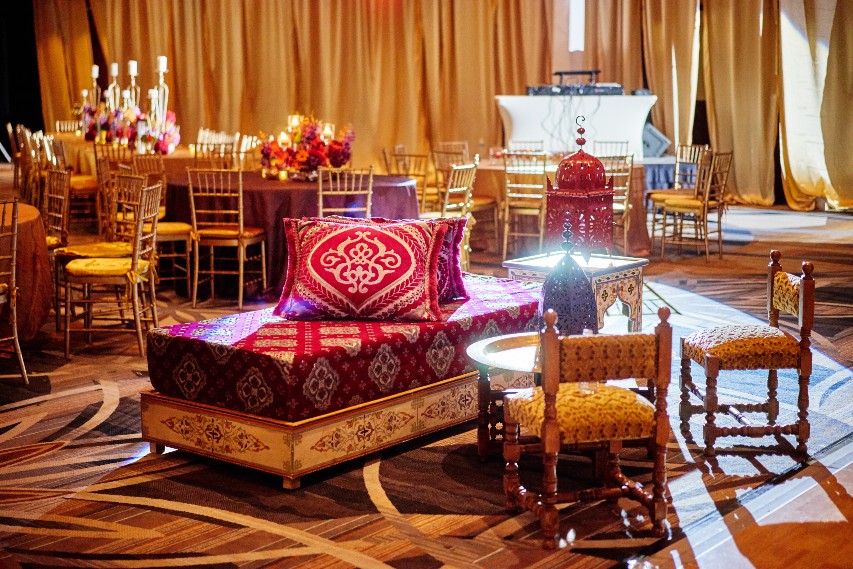
Some of the most crucial events in the Indian wedding take place at the groom’s house or other private location and involve only certain close family members. These separate events demonstrate the importance of the bride’s and groom’s families in Indian culture.
The precise day on which ceremonies occur can vary. A longstanding Indian wedding tradition involves having an astrologer select an auspicious date for each of the rituals in the wedding, including the wedding date itself.
The Roka
Roka, which means prevention, is an event in which the bride and groom see each other and agree to the marriage. It can be a small gathering or a large ceremony, but regardless of the venue, there will be food and celebration. It could take place at a relative’s home or in an Indian wedding hall. The choice of Indian wedding venue and traditions differ from one family to the next.
Tilak
Before the wedding, male members of the bride’s family apply a mark (“tilak”) made of ash to the groom’s forehead to symbolize their acceptance of the union and the desire for the bride to have a happy, loving marriage.
Sagaai (Engagement)
The groom’s family ceremonially asks for the bride’s hand in marriage, and the bride and groom exchange rings. The ceremony could transpire earlier, but the Roka must happen first.
The Mehendi (or Mehndi) Party
The bridal party, including female family members, will throw a party for Indian brides a few days before the wedding. The bridal party will also decorate the bride’s hands with henna.
The Wedding Ceremony
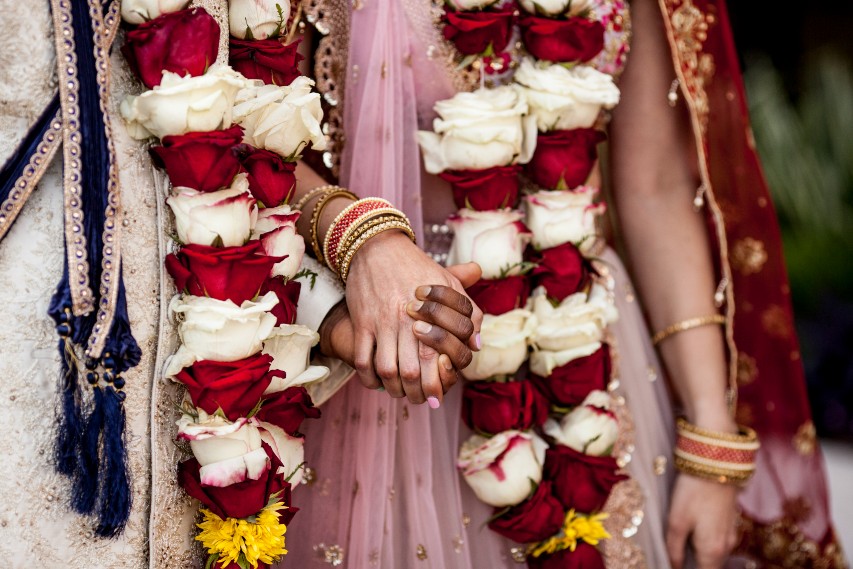
The Baraat
The Baraat, or the groom’s procession, is a grand ceremony that involves the groom arriving at the venue on a white horse or elephant. The groom wears a turban with a veil and a long jacket (sherwani). The Baraat can involve hours of dancing and traditional folk song singing.
The bride’s mother might apply a tilak on the groom’s forehead to prevent evil from befalling him during the ceremony.
The Kanya Aagaman or Arrival of the Bride
During the wedding procession, the bride’s aunt and uncle will escort her to the wedding altar (mandap) or convey her in a ceremonial carriage. An Indian bride will typically wear a red and gold lehenga (long skirt) and gold jewelry for the occasion.
The Ceremony
Once the ceremony begins, the bride’s parents will give away the bride. The bride and groom will take their wedding vows. The ceremony takes place under the altar. At the center of the altar is a ceremonial fire pit.
After the bride’s brother-in-law provides rice to the bride and groom, they use it to start a fire. The bride and groom make offerings to the holy fire.
The bride, groom, and members of the groom’s family perform a series of Indian wedding rituals that unite the couple and affirm the bride’s new status as a married woman. These include the exchange of floral garlands.
The Saat Phere or Seven Circumambulations
Of all the wedding ceremonies and rituals in a Hindu wedding, the saat phere most strongly cements the couple’s vows.
Both the bride and the groom walk around the sacred fire seven times to affirm their vows.
After the ceremony, the groom applies a tilak to the bride’s forehead.
The Saptapadi
To finalize the process of becoming man and wife, the couple takes seven steps together while a pandit reads seven verses wishing them a lifelong marriage and a strong family.
The Wedding Party
After the wedding ceremony, the wedding reception features food, dancing, singing, and celebration at the wedding reception hall. The Indian wedding venue and traditions give the couple a grand and lavish spectacle.
Book Your Traditional Indian Wedding Ceremony and Celebration at Metropol Banquet Hall
If you are new to Indian wedding traditions, you might not have to know every detail of these wedding traditions and honor every traditional wedding custom. At Metropol Banquet Hall, we handle every aspect of the Indian wedding venue and traditions, from creating a formal Indian wedding ballroom to coordinating the wedding menu and planning a wonderful wedding day.
Check price and availability of our venue or contact us today at (818) 241-5432!
Read More:- The Complete Guide: Quinceanera Traditions You Need To Know
